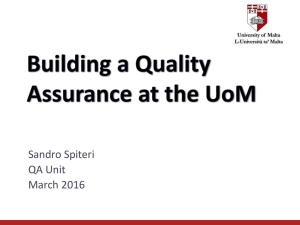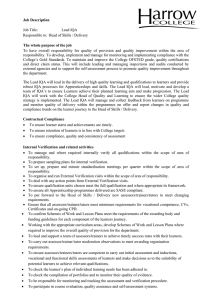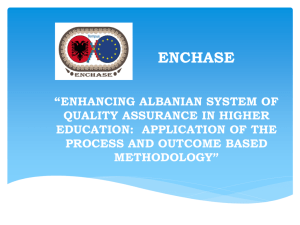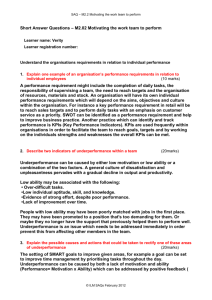(IQA) Policy - e-Response Crowd Safety Training
advertisement
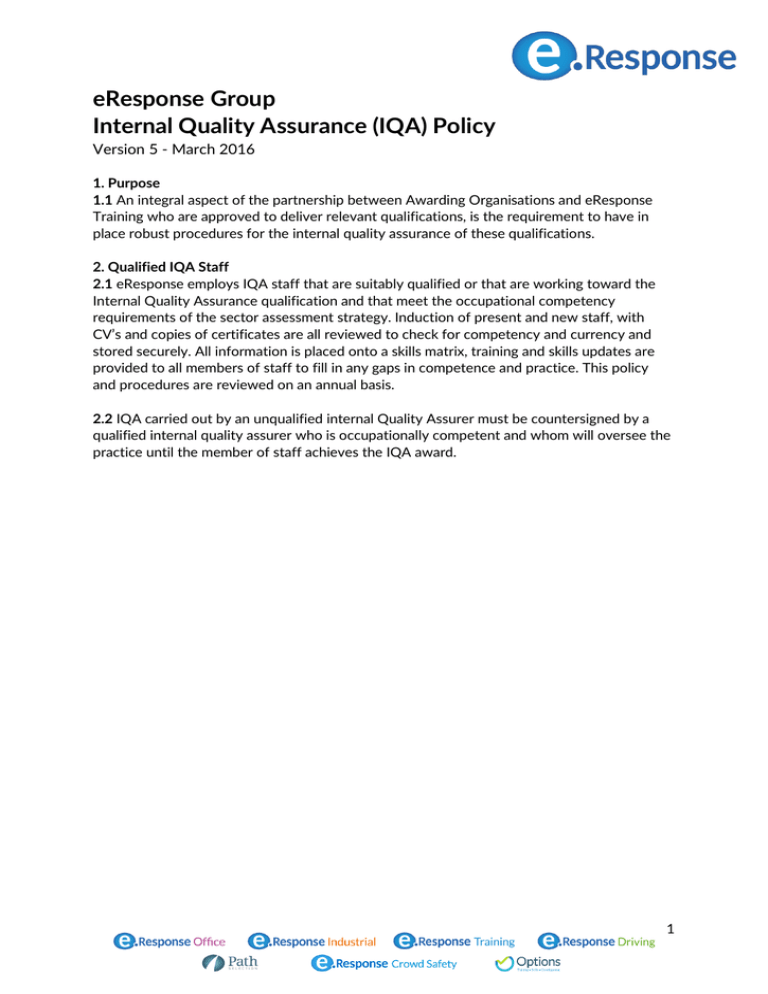
eResponse Group Internal Quality Assurance (IQA) Policy Version 5 - March 2016 1. Purpose 1.1 An integral aspect of the partnership between Awarding Organisations and eResponse Training who are approved to deliver relevant qualifications, is the requirement to have in place robust procedures for the internal quality assurance of these qualifications. 2. Qualified IQA Staff 2.1 eResponse employs IQA staff that are suitably qualified or that are working toward the Internal Quality Assurance qualification and that meet the occupational competency requirements of the sector assessment strategy. Induction of present and new staff, with CV’s and copies of certificates are all reviewed to check for competency and currency and stored securely. All information is placed onto a skills matrix, training and skills updates are provided to all members of staff to fill in any gaps in competence and practice. This policy and procedures are reviewed on an annual basis. 2.2 IQA carried out by an unqualified internal Quality Assurer must be countersigned by a qualified internal quality assurer who is occupationally competent and whom will oversee the practice until the member of staff achieves the IQA award. 1 3. The IQA Process 3.1 IQA is a quality mechanism, which assures the validity, reliability, fairness, sufficiency, currency and authenticity of assessments undertaken and if support is identified and required, this can be arranged to ensure quality continues throughout. IQA practice and outcomes inform quality improvement mechanisms and self-assessment to improve the standard and reliability of the provision giving learners and employer’s value for money and a good successful experience. 3.2 IQA of eResponse programmes takes place, in the workplace, or at one of eResponse sites, whichever is the most appropriate for the type of IQA activity, by a team of trained IQAs (to Current approved standards of IQA), prior to External Quality Assurance (EQA) taking place). 3.3 It is the responsibility of the assessor to ensure that the learner’s portfolio or e-portfolio is completed according to the Awarding Organisation standards and meets good practice expectations for the quality of learner work and robust assessment before it is presented for IQA. 3.4 IQA is not re-assessment of a learner’s portfolio but it takes place to ensure that what should have been done, during assessment, has been completed efficiently to meet Awarding Organisation standards. IQA observations of assessors/tutors will support the process. 3.5 IQA takes place via sampling of portfolios or e-portfolios. The number of portfolios sampled by the internal Quality Assurance team will ultimately represent a sufficiently accurate picture of the quality of delivery and assessment for the centre to be confident that what has not been sampled also meets the required standards. This will be reviewed regularly by the lead IQA to reflect current status. The sampling strategy will reflect Candidates, Assessors, Methods of Assessment, Evidence, Records and Assessment Locations. 3.6 Appropriate documentation of sampling must be completed to include sampling plans, a record of IQA completed, feedback to IQA colleagues and resulting action plans to improve assessment, marking, tracking, recording and monitoring of learners progress, success and feedback to learners and each IQA’s practice. 3.7 The range of units and elements within the qualification along with all assessors/tutors involved in delivery are to be sampled regularly to ensure standardisation, robust delivery and assessment of learners’ work and portfolio development. 3.8 The IQA team should liaise with the External Quality Assurer from the relevant Awarding Organisation in order to demonstrate that the IQA system and processes are practical, efficient and effective, workable and ultimately timely assures the quality of provision. 3.9 Each eResponse’s programme has an IQA folder containing all the relevant documentation, complied and completed by the IQA member of staff allocated to each sector provision. 2 4. Guidance for Trainer / Assessors 4.1 IQAs and assessors/tutors may use assessment and recording documentation produced by the Awarding Organisations or eResponse’s devised formative and summative assessment and IQA records. 4.2 The Awarding Organisation assessment paperwork must be completed according to their standard requirements, unless alternative arrangements have been made with your External Quality Assurer and meet internal and external quality standards. 4.3 eResponse’s devised documentation should include such details as the learner’s name, company, employer, qualification and level, start and completion dates, initial assessment outcomes, any barriers to learning and additional learning support needs as the bare minimum. 4.4 As a minimum, the portfolio should contain a declaration stating that this is completely the work of the learner. The declaration will be signed by the learner and assessor/tutor (and IQA if sampled) and included in the learner journey records and portfolio. 4.5 Regular team meetings which include standardisation of assessment methods, IQA and assessor/tutor practice and all paperwork will be held with assessors and the IQA team. 4.6 If any issues are raised during the IQA process, a member from the IQA team will contact the assessor/tutor via their eResponse email address. They will contact the IQA within 1 week of the email being sent to the assessor/tutor, so actions/issues raised can be completed and that the correct support can be arranged. The assessor/tutor has 1 calendar month to resolve the issues/actions that have been raised. It is the responsibility of the assessor/tutor to resubmit any portfolios/tutor packs, so that the IQA can verify that the certification process can proceed. All actions will be actioned and signed off by IQA. 4.7 Risk assessment for Assessors/Tutors: HIGH RISK: new assessor/tutors, new staff, new to programme/AO linked to sanction by EQA or if deemed necessary by the IQA. MEDIUM: experienced and sound assessor/tutor but few portfolios (less than 6) experienced but different level/AO or if deemed necessary by the IQA. LOW: experienced and sound assessor/tutor with current programmes and levels. 3 5. Role of IQA staff 5.1 The IQA staff member (often referred to as Internal Verifier or IV) is in place to assure the quality of provision and to aid improvements to procedures. The role should cover the following areas: Ensure an effective system of recording learner enrolment, initial assessment and robust planning of learning, learners’ retention, achievement and success is in place. Form an IQA sampling plan for a programme of delivery and implement changes where required. Keep records of IQA and action plans which should be detailed in an IQA corrective action log and fed into the standardisation plans. Ensure that appropriate swift and timely corrective action is taken where necessary. Keep accurate and up-to-date records of the internal Quality Assurance process including assessor/tutor risk rating and standardisation activities. Advise and standardise assessors/tutors on the appropriateness and quality of assessment evidence with regard to level, sufficiency, authenticity, validity, reliability, consistency and currency. Use sector knowledge and experience to sample assessments to verify assessors/tutors judgements, ensuring that they are consistent, fair and reliable. Keep up to date with TAQA policies and procedures. Attend CPD and standardisation meetings as required. Work closely with the Lead IQA and Quality and Standards Director and report any concerns promptly. 4 6. Role of Lead IQA The Lead IQA will: Be approved by the Quality and Standards Manager and will be given only access to A.O. online systems. Liaise with the Quality Lead to quality assure the whole Learner Journey, including recruitment, enrolment, initial assessment, teaching, certification and learner progress, as required. Register Learners with the exam department. Put IQA on a “risk” chart (see below) at the beginning of each year or start of programme. Arrange and co-ordinate standardisation of IQA meeting with a minimum of 3 per year for long courses/ 1 for short courses. All minutes will be available centrally and added to quality files. Co-ordinate and monitor the process and provide support to IQAs in their team, Assessor/Tutors and relevant staff. Audit IQA plans and documentation relating to the plans to which IQA must adhere. Complete a pre EQA visit form and write an action plan if necessary in preparation for and EQA visit. Arrange and lead EQA visits and liaise with Awarding Organisations as required. Write an action plan as required following receipts of EQA reports, liaising with the IQAs and managers. Monitor the action plan until removal of sanction, liaising with the Quality Lead. 5 Lead IQAs are to ensure, in collaboration with IQAs and Quality and Standards Managers. o That assessors/tutors are suitably inducted, performance managed, led and supported. o That IQA trainees are supported appropriately throughout their training programme. o Monitor of assessment/training judgements and outcomes. o Standardisation of assessment/training judgements and subsequent actions where required. o Appropriate robust current records are kept relating to learners and assessor/tutors. o External and internal guidance on IQA is adhered to. o CPD and CV updates, industrial up skilling, occupational competence and qualification review and upgrade as necessary. o Monitor qualifications changes and updates from Awarding Organisations and Ofqual. o Adhere to the Ofsted Common Inspection Framework requirements and embed into assessment, quality assurance and improvement activity to ensure good practice. Policy approved by: Barbara Van der Eecken – Director of Quality and Standards Date Updated: 29/03/16 Date for Review: March 2017 6
